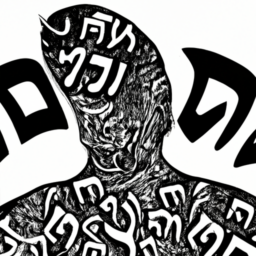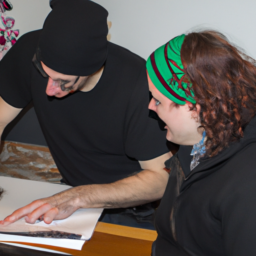In recent years, Hebrew tattoos have become increasingly popular, with many people drawn to the beauty and depth of meaning in the ancient script. However, there are common mistakes that can occur when getting a tattoo in a language that is not your own. This article will guide you through the process of understanding the tattoo translation and meaning of Hebrew characters, choosing the right tattoo design and fonts for your Hebrew tattoos, and will provide a comprehensive guide for tattoo consultation, pricing, and care for prospective Hebrew tattoo artisans. Whether it’s your first tattoo or you’re adding to your collection, our aim is to ensure you get a meaningful and correctly translated piece of art.
1. "Understanding the Tattoo Translation and Meaning of Hebrew Characters"
When deciding on Hebrew tattoos, one crucial aspect to bear in mind is understanding the tattoo translation and meaning of Hebrew characters. Hebrew, a right-to-left Semitic language, is deeply symbolic and historical. Every character, every stroke, possesses a unique meaning and significance. Therefore, it’s essential to ensure the tattoo translation is accurately done to avoid regrettable mistakes or misinterpretations.
First and foremost, the tattoo design should be carefully considered. The desired Hebrew characters should resonate with your personal values, beliefs, or experiences. It could be a word, phrase, or even a name that holds deep meaning for you. For instance, a word like "Shalom", which means peace, is a common choice among Hebrew tattoos.
Next, the tattoo translation process is vital. It’s recommended to consult with a knowledgeable person proficient in Hebrew language. This is to avoid common mistakes like inverted letters, misspellings, or incorrect translations. Online translation tools, though convenient, may not provide the accurate translation required for such a permanent commitment.
The choice of tattoo fonts also plays a crucial role in the overall appearance of your Hebrew tattoo. Hebrew characters are visually distinct, and different fonts can dramatically alter the aesthetics of your tattoo. Tattoo artisans usually have a range of font options from which you can select the one that suits your personal style and the intended tattoo placement.
Once the tattoo design and translation are finalized, the next step is to find a skilled tattoo artisan. It’s advisable to seek a tattoo consultation before committing to the procedure. During this consultation, discuss your design, the tattoo meaning, and the pricing. Remember, a good tattoo isn’t cheap and a cheap tattoo isn’t good. So, make sure you’re comfortable with the tattoo pricing before proceeding.
After getting your Hebrew tattoo, proper tattoo care is critical to ensure it heals correctly and retains its vibrancy over time. Follow the instructions of your tattoo artisan on how to care for your new tattoo.
In conclusion, getting Hebrew tattoos can be a deeply personal and unique way to express oneself. However, understanding the tattoo translation and meaning of Hebrew characters is vital to avoid common mistakes. With careful planning and consultation with knowledgeable translation experts and skilled tattoo artisans, you can have a meaningful and aesthetically pleasing Hebrew tattoo that you’ll be proud to wear.
2. "Choosing the Right Tattoo Design and Fonts for Your Hebrew Tattoos"
When considering Hebrew Tattoos, choosing the right tattoo design and fonts plays a critical role in ensuring your tattoo not only looks appealing but also holds the correct meaning and significance. Hebrew characters are unique and have a deep history, making it essential to choose the right design and font to reflect your intended sentiment accurately.
Tattoo artisans suggest that your tattoo design should resonate with your personality and the message you wish to convey. Hebrew tattoos are often chosen for their profound symbolism, so consider the tattoo meaning before finalizing your design. For instance, some people opt for popular Hebrew phrases from religious texts, while others prefer names or words that hold personal significance.
When it comes to tattoo fonts, Hebrew characters can be a bit tricky. The language is written from right to left, which is opposite to many other languages. This distinctiveness can lead to errors if the person doing the tattoo is not familiar with Hebrew. Therefore, ensure that your tattoo artisan is well-versed with the language and its nuances to avoid any mistakes.
The choice of font can dramatically alter the look and feel of your Hebrew tattoos. Some people prefer traditional scripted fonts that echo the ancient origins of the language, while others may choose more modern, minimalist styles for a contemporary look.
Another aspect to consider is Tattoo pricing. It can vary depending on the complexity of the design, the size, and the expertise of the tattoo artisan. Before getting your tattoo, you should have a tattoo consultation with your chosen artist to discuss design options, pricing, and tattoo care.
Tattoo translation is another critical aspect to consider. The translation must be accurate to ensure the tattoo conveys the intended message correctly. Hebrew is a complex language with many words having multiple meanings, so be sure to consult a language expert or a reliable translation service.
Lastly, don’t forget about tattoo care. Hebrew characters, with their intricate details, require careful aftercare to maintain their clarity and beauty. Your tattoo artisan should provide you with detailed aftercare instructions to follow.
In conclusion, when it comes to Hebrew tattoos, careful consideration of the design, fonts, translation, and aftercare can help you avoid common mistakes and ensure you have a tattoo that you can proudly wear for a lifetime.
3. "Tattoo Consultation, Pricing, and Care: A Guide for Prospective Hebrew Tattoo Artisans"
Tattoos, especially Hebrew tattoos, are a unique form of personal expression. However, getting a tattoo involves a significant commitment, not just in terms of time and money, but also skin real estate. This section will provide a guide for prospective Hebrew tattoo artisans on tattoo consultation, pricing, and care.
Firstly, in the tattoo consultation phase, it’s crucial to communicate effectively with the client to understand their desired tattoo design and tattoo meaning. For Hebrew tattoos, this involves a deep understanding of the Hebrew characters and their meanings. Tattoo artisans need to accurately translate the desired English phrases or words into Hebrew and present them in a suitable tattoo design. This is where the use of precise tattoo fonts comes into play. The choice of font can significantly impact the aesthetic appeal of Hebrew tattoos and the conveyance of the intended tattoo meaning.
Tattoo translation could be a tricky business, especially with languages like Hebrew that have deep historical and cultural implications. Therefore, it is recommended that tattoo artisans take help from professional translators or linguistic experts if they are not proficient in Hebrew themselves. This will ensure the accuracy of the tattoo translation and avoid common mistakes that can turn an intended meaningful tattoo into a source of regret.
Pricing is another essential aspect of the tattoo process. Tattoo pricing varies depending on factors such as the complexity of the tattoo design, the time taken, the expertise of the tattoo artisan, and the geographical location of the tattoo studio. Hebrew tattoos, given their intricate nature and the need for accurate translation, may cost more than a typical English script tattoo. However, remember that a tattoo is a lifelong commitment, and skimping on the cost may lead to dissatisfaction in the long run.
Lastly, tattoo care is vital to maintain the beauty and longevity of the tattoo. After getting a Hebrew tattoo, tattoo artisans should provide clients with a detailed aftercare guide. This includes keeping the tattoo clean, avoiding direct sunlight, and refraining from scratching or picking at the tattoo. Proper tattoo care will help ensure the tattoo heals correctly and maintains its vibrant colors and sharp lines.
In conclusion, becoming a successful Hebrew tattoo artisan involves careful tattoo consultation, fair tattoo pricing, and providing comprehensive tattoo care instructions. With the right approach, you can create beautiful and meaningful Hebrew tattoos that your clients will cherish for a lifetime.

